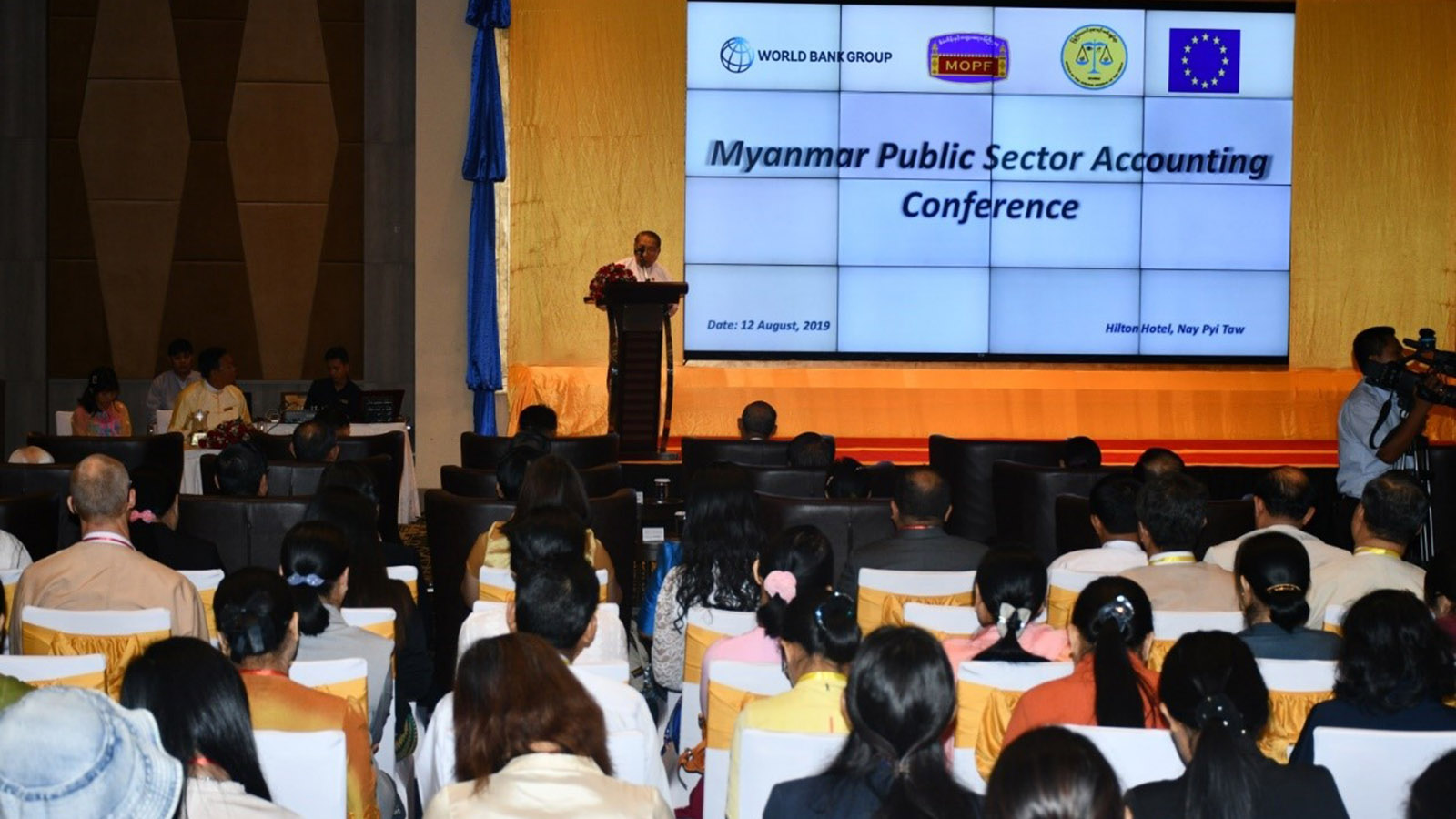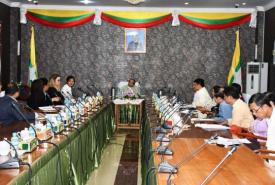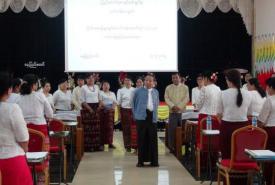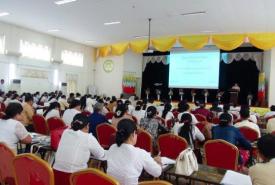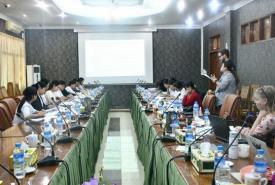8 April
Union Auditor-General Office: Ensuring efficiency, management of public finances
The Union Auditor-General Office operates under the motto, ‘Developing and administering public finance management’ and constantly works hard to make its processes more efficient, increase transparency, accountability and responsibility, ensure public finances are used for the benefit of the citizens, their values and the nation, and provide highly-skilled staff to assist the Union Government.
The Union Auditor-General Office has been performing financial audits, compliance audits, performance audits and comprehensive audits for successive generations in Myanmar. It also reviews the financial statements of organizations and checks whether they comply with existing laws.
Similarly, the UAG Office implements the 3E Audit perspective of Economy, Efficiency and Effectiveness towards the department’s financial accounts at the same time and compiles them into the Financial Audit Report.
The current Union Auditor-General is U Maw Than and the UAG Office has inspected reports sent to the President and Pyidaungsu Hluttaw since 2012-2013 financial year. These include checking implementation of estimated Union budget and adherence of ministries and organizations on existing laws, regulations and directives. Based on the findings, the UAG Office notified of budget to be returned to the State, action to be taken and other aspects of work processes.
The UAG Office sends reports to relevant departments and organizations to ensure they comply with existing financial rules. Reports from state/regional auditor-general offices are incorporated into the Union Auditor-General’s report and submitted to the President and the Pyidaungsu Hluttaw, in accordance with Section 11-(a) and (o) of the Union Auditor-General Law.
State/regional auditors-general also submit reports concerning their state/regional budgets and funds to the local Hluttaw, in accord with Section 25-(a) and (d) of the Union Auditor-General Law.
Important findings are taken action in line with Section 11-(s) of the Union Auditor-General Law with a Management Letter sent to the respective head of the organization concerned or personnel from Union-level or state/regional organizations. Their replies are reviewed and submitted to the President and the Pyidaungsu Hluttaw in the UAG’s report.
The UAG Office assisted Union-level ministries and institutions in the fourth year of the civilian government regarding their budget and inventory proposals, requests to remove losses incurred from the account, transferring tangible assets between organizations, signing MoUs and business agreements, outsourcing audits and maintaining finances. In that regard, the UAG Office has sent 257 suggestion letters to ministries and organizations, giving advice where necessary.
The UAG Office designed the UAG Office Strategic Action Plan (2018-2022) to better serve the nation and its citizens and set 7 Strategic Goals as well.
The first strategic goal is to compile a guidebook based on the International Standards of Supreme Audit, Institutions (ISSAI). A workshop on ISSAI Based Financial Audit၊ Performance Audit and Compliance Audit was conducted and the Financial Audit Practical Guidelines was published. Future manuals and practical guidelines and tools will be published as well.
The second strategic goal is to enact the International Public Sector Accounting Standard (IPSAS) and the UAG Office is working with the World Bank and EU to design transition plans and roadmaps for IPSAS and IFRS while also collaborating with the Ministry of Planning, Finance and Industry for implementation. IPSAS is also taught as a separate subject in departmental training courses.
Strategic Goal-3 involves making auditing processes more efficient and for that matter, a quality assurance review guidebook has been published. The Union Auditor-General Bylaw is underway and the Internal Audit Division is being strengthened.
Strategic Goal-4 concerns improving organizational integrity, human resource management and enhancing staff capabilities. In that sense, the HR Plan for 2019-2020 was designed together with HR Policy, HR Strategy and Competency Framework.
The fifth strategic goal concerns implementing the e-Government system and an IT strategy is in development. The Mini Data Center will be used to share IT news and conduct video conferencing between the headquarters and data centres.
Strategic Plan-6 is to enhance public finance management and a relevant strategic plan for 2014-2021 was developed.
The seventh strategic plan focuses on participating in activities of (ASEANSAI), (ASOSAI) and (INTOSAI), regular workshops with ASEANSAI, ASOSAI, INTOSAI, and ensuring long-term cooperative audits with member nations.
Union Auditor-General U Maw Than said their Strategic Work Programme (2018-2022) is already 60 per cent complete. He said the UAG Office cooperated with EU in the current government’s fourth year of administration in ISSAI based auditing, practical implementation of Rollout Plan of Financial Audit Practical Guide, and cooperating with Joint Public Accounts Committee and the Norwegian Auditor-General Office to conduct a workshop for legal aspects and legislation of Independence Mandate.
The Union Auditor-General said the cooperation with their Norwegian counterpart for publishing guidelines for reviewing work processes and legal compliance went well. He said GIZ provided technical support to conduct a survey on how much private banks understood IFRS. He said the survey results were used to decide which banks to interview and select those who could transition to IFRS and conducting related workshops.
The UAG Office also collaborated with World Bank and EU to organize the Myanmar Public Sector Accounting Conference, design a transition plan for IPSAS, forming an IPSAS Implementation Preparatory Committee, and arranging IPSAS Basic and Advanced courses and IFRS courses with technical support from the European Union.
Myanmar Accountancy Council (MAC) provides certified public accountant courses and diploma accountant courses every year. Certified public accountant courses used to be eligible for only B.Com graduates from the University of Economics but is now available for B.Com, B.Act and BBA graduates from the University of Economics, MAC graduates with ACCA Fundamental Skills Level, and those with CIMA Diploma in Management Accounting since Batch No.43 in 2017-2018 academic year.
Furthermore, B.Bsc (Accounting and Finance) graduates from the Co-operative University can also attend the certified public accountant course as of Batch No.45 in 2019-2020 academic year. U Maw Than said they have removed the need for taking entrance exams so that people can now attend the courses directly.
Since its inception in 1972, there have been 3,820 graduates of the first part of certified public accountant courses, 2,628 graduates of the second part, 8,743 graduates of the first part of diploma accountant courses and 4,607 graduates of the second part.
The Myanmar Institute of Certified Public Accountants – MICPA was established in 2014 in accordance with Myanmar Accountancy Council Law and cooperates with MAC in accountancy processes in addition to providing suggestions to the council regarding curriculum, guideline, standard and regulation amendments.
The UAG Office began operating its Mini Date Centre in August 2018 and is now capable of sharing documents within its departments and with MAC, with Yangon, Mandalay and Bago region auditor-general offices, with the Ministry of Planning, Finance and Industry and Myanmar Economic Bank.
The UAG Office purchased the financial audit assistance tool Data Analytic Tools (IDEA) and formed two Pilot Audit Team, with possible extension in future years based on performances. The office is planning to use Audit Flow in their Performance Audit to maintain their documents better.
MAC is chaired by the Union Auditor-General and the UAG Office handles MAC processes as well, in accordance with the Myanmar Accountancy Council Law. U Maw Than said people had to apply individually for permits to practice accountancy in the private sector. He said that since the enactment of the Myanmar Accountancy Council Law (2015), applications can be made in groups or companies.
MAC signed an agreement with IFRS Foundation Corporation and issued the IFRS (Up to Date Version) with a notification in July 2018 for all relevant organizations and companies wishing to follow the standards.
The UAG Office will cooperate in the Myanmar Sustainable Development Programme (MSDP) in Strategy 1.4 Enhance good governance, institutional performance and improve the efficiency of administrative decision making at all levels, 1.4.2 enhancing parliamentary oversight as part of standard budget, planning and Audit Process.
Twelve task teams were formed for implementing the National Indicator Framework to monitor the MSDP implementation process. The UAG office is participating in the Rules of Law Team and Monetary and Investment Team for Strategy 2.5 Enhancing the efficiency and competitiveness of State-owned Economic Enterprises (SEEs) through Indicator 2.5.3 Number of percentage of SEEs having undergone a full or partial performance audit.
The Union Auditor-General Office and Data Auditor Office will continue to work for the benefit of the nation and the people. The UAG Office submits their report to the Pyidaungsu Hluttaw every financial year and assists in preventing and uncovering corruption and bribery. They will continue to prevent losses to public finances and protect taxpayers’ contribution to the nation.
(Translated by Pen Dali)
